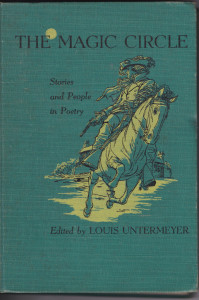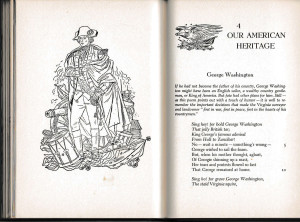Thanks to the wonders of the fully-engaged internet, I finally got around to finding and replacing a book that I had as a kid. It was a collection of poetry, with nice little introductions to each poem aimed at enlightening the junior reader. I certain that I had this book as one of my Christmas or birthday presents sometime between the age of eight – when I began to read confidently – and the age of twelve when I was doing so voraciously. I remembered the poems in the book better than I recollected the title: there was The Lady of Shalott, and The Highwayman, poems by Longfellow, Kipling, Edgar Lee Masters, William Shakespeare, Robert Service and Robert Browning, John Greenleaf Whittier, an excerpt from The Lays of Ancient Rome, a comic bit of verse from W.S. Gilbert, Coleridge’s’ Kublai Khan and a poem by Robert Nathan about two English teenagers venturing to Dunkirk in their own sailboat to rescue the British Army. The poems were enlivened by simple line drawings. Of course, some of these poems were further set in my mind by being assigned to memorize them in Mr. Terranova’s sixth grade class, but in its way, this slim little hardback book was an excellent short compendium of old poetical standards, of the sort that once everyone knew and could recite a verse or two from … or at least recognize an illusion dropped into ordinary conversation or in a popular novel.
Eventually, just about all our childhood books devolved on me. I was the first of my parent’s children to produce offspring, and they took the opportunity of packing up just about every scrap of the remaining kid-lit in their house upon the occasion of the Air Force offering a generous hold baggage allowance after that year that she spent living with my parents. They obligingly directed the packers to the kid-book library, the few personal items of mine left behind, and dispatched them along with my daughter’s hold baggage. But the book of poetry was not among them, although I did look for it, now and again. I can only think that perhaps it was overlooked, or had gravitated to the household of my sister or brothers. In any case, I missed it. All that I could remember was that it was called The Magic Circle. Fruitless looking for it by that name – until a year or so ago when I found it among the used book offerings on Amazon. Yes – that was that very same fabric cover, dark blue with a two-color embossment on the cover of a horse-mounted highwayman under a full moon. I added it to my wish list and ordered it some weeks ago – and there it was, arrived in the mail on Friday.
Yes, the very book that I remembered – although absent the inscription in the front from my parents, noting what birthday or Christmas that it was given to me. It’s about as lovingly worn as my own copy was – and someone took a pencil and wrote “Billy†in block letters along the long side of the pages, and “St Paul†along the top and bottom. But still – the book that I remembered so fondly. I didn’t remember that it was subtitled “Stories and People in Poetry†– but that was a thing obvious.
I leafed through it – noting that it was edited by Louis Untermeyer. I presume that he wrote the various introductory notes to the poems. And another thing that I noted too – the very maturity of the poems. I mean – it was a casual expectation up until recently that elementary- and middle-school children would eagerly read this material. I leafed – metaphorically – through several recent collections of poetry for children which didn’t contain nearly as many of the classic, heavy-hitter poets of the 19th century as this single volume did. Too many long hard words, I guess. Lots of more modern minor poets in the newer anthologies, most of whom I have never heard of, and materiel written specifically for children. And the categories for the poems were quite a bit more mundane. Looking through The Magic Circle, I see “Strange Talesâ€, “Gallant Deeds, “Unforgettable People,†“Our American Heritage†and “Ballads of the Old Days†among others. Practically an antique, this collection is – and dear to me because many of the poems were as challenging as they were stirring, not dumbed-down pap meant to be read in a safe space.
Anyway, I’m glad to have it back – even better than I remembered.


